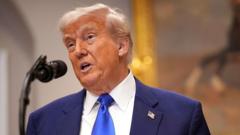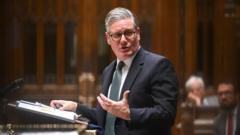The recent trade agreement between the European Union (EU) and four major South American economies marks a significant step towards economic collaboration. European Commission President Ursula von der Leyen described the pact as a "truly historic milestone," emphasizing its importance in a world marked by increasing tensions. The deal, pending ratification by EU states, promises reduced tariffs and streamlined customs for businesses trading across the continents, boosting economic interactions and broadening market access.
EU Strengthens Ties with South America through New Trade Agreement

EU Strengthens Ties with South America through New Trade Agreement
The European Union has reached a trade deal with key South American nations, aiming to enhance economic cooperation and access to essential raw materials.
This partnership is poised to benefit both sides economically. In the past year, Europe exported nearly $59 billion worth of goods primarily to Argentina, Brazil, Paraguay, and Uruguay, including vehicles, machinery, and pharmaceuticals. In exchange, South America exported approximately $57 billion in goods to Europe, predominantly minerals such as lithium and nickel, critical for the electric vehicle industry. As demand for these minerals rises, European car manufacturers stand to gain significantly from this deal.
A vital aim of the agreement is to deepen trade ties between the EU and Mercosur—a regional bloc formed by the aforementioned South American countries. Together, these regions encompass around 700 million consumers, accounting for about 20% of global economic output. An optimistic outlook for this deal is shared among leaders on both sides, with hopes for sustainable growth and expanded opportunities.
However, challenges remain, particularly concerning environmental standards and compliance, which have previously stalled progress. The initial negotiations began back in 2000, and a prior agreement in 2019 was never ratified due to concerns over sustainable farming practices. Changes in administrations in Brazil and Argentina may have alleviated some of these issues, but hurdles still exist.
Uruguayan President Luis Lacalle Pou highlighted the importance of integrating smaller economies like those in Mercosur into the global marketplace. Nonetheless, strong reservations from some EU member states, notably France, Italy, and Poland, could impede final approval due to fears of unfair competition for their farmers who face stricter regulations.
In response to the announcement, France's Trade Minister Sophie Primas insisted that discussions in Montevideo do not guarantee the deal's validity. She noted that France would resist at every level to ensure the concerns of member states are heard. On the other hand, Germany views the deal as an invaluable opportunity for its exporters during economic uncertainty and aims to work towards reconciling conflicting positions.
With competing voices within Europe on this trade deal, the European Commission’s ability to achieve consensus among member states will determine its implementation and the potential economic benefits that could arise from closer ties with South America.
A vital aim of the agreement is to deepen trade ties between the EU and Mercosur—a regional bloc formed by the aforementioned South American countries. Together, these regions encompass around 700 million consumers, accounting for about 20% of global economic output. An optimistic outlook for this deal is shared among leaders on both sides, with hopes for sustainable growth and expanded opportunities.
However, challenges remain, particularly concerning environmental standards and compliance, which have previously stalled progress. The initial negotiations began back in 2000, and a prior agreement in 2019 was never ratified due to concerns over sustainable farming practices. Changes in administrations in Brazil and Argentina may have alleviated some of these issues, but hurdles still exist.
Uruguayan President Luis Lacalle Pou highlighted the importance of integrating smaller economies like those in Mercosur into the global marketplace. Nonetheless, strong reservations from some EU member states, notably France, Italy, and Poland, could impede final approval due to fears of unfair competition for their farmers who face stricter regulations.
In response to the announcement, France's Trade Minister Sophie Primas insisted that discussions in Montevideo do not guarantee the deal's validity. She noted that France would resist at every level to ensure the concerns of member states are heard. On the other hand, Germany views the deal as an invaluable opportunity for its exporters during economic uncertainty and aims to work towards reconciling conflicting positions.
With competing voices within Europe on this trade deal, the European Commission’s ability to achieve consensus among member states will determine its implementation and the potential economic benefits that could arise from closer ties with South America.



















